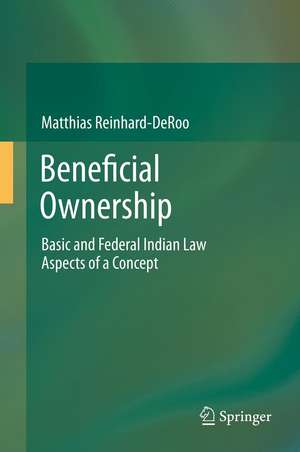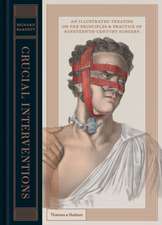Beneficial Ownership: Basic and Federal Indian Law Aspects of a Concept
Autor Matthias Reinhard-DeRooen Limba Engleză Hardback – 15 oct 2013
This book approaches these questions from two perspectives: legal fundamentals and the field of U.S. federal Indian law. Both legal theories and case law are scrutinized with the aim to find a better understanding of the basic conception and characteristics of beneficial ownership. Federal Indian law has been chosen for the study of the concrete implications of the beneficial ownership concept in what Roscoe Pound referred to as “the law in action.” To some, this choice of legal field might seem somewhat unusual. What answers could federal Indian law possibly offer with regard to pressing questions from the financial industry? As always, there is a short and a long answer. The short answer is that the analysis of an equally sophisticated field of law can open new perspectives on a given field of law. For example, not only potential criminals and tax evaders but also members of an older civilization are beneficial owners. The long answer can be found in this very book.
| Toate formatele și edițiile | Preț | Express |
|---|---|---|
| Paperback (1) | 551.31 lei 39-44 zile | |
| Springer International Publishing – 23 aug 2016 | 551.31 lei 39-44 zile | |
| Hardback (1) | 641.03 lei 6-8 săpt. | |
| Springer International Publishing – 15 oct 2013 | 641.03 lei 6-8 săpt. |
Preț: 641.03 lei
Preț vechi: 754.15 lei
-15% Nou
Puncte Express: 962
Preț estimativ în valută:
122.66€ • 128.75$ • 101.81£
122.66€ • 128.75$ • 101.81£
Carte tipărită la comandă
Livrare economică 10-24 aprilie
Preluare comenzi: 021 569.72.76
Specificații
ISBN-13: 9783319016856
ISBN-10: 3319016857
Pagini: 200
Ilustrații: XXIX, 151 p. 8 illus.
Dimensiuni: 155 x 235 x 17 mm
Greutate: 0.44 kg
Ediția:2014
Editura: Springer International Publishing
Colecția Springer
Locul publicării:Cham, Switzerland
ISBN-10: 3319016857
Pagini: 200
Ilustrații: XXIX, 151 p. 8 illus.
Dimensiuni: 155 x 235 x 17 mm
Greutate: 0.44 kg
Ediția:2014
Editura: Springer International Publishing
Colecția Springer
Locul publicării:Cham, Switzerland
Public țintă
ResearchCuprins
Introduction.- The Term Beneficial Ownership.- Beneficial Ownership as a Concept.- Common Law, Equity and Beneficial Ownership.- Beneficial Ownership Used in U.S. Supreme Court Decisions.- Fundamental Aspects of Federal Indian Law.- The Beneficial Ownership Concept Applied in Federal Indian Law.- Epilogue.
Textul de pe ultima copertă
The hunt for beneficial owners is on. Like an elephant, the beneficial owner hides in the jungle of complex legal structures, waiting to be discovered by eager prosecutors. But what lies behind this metaphor? What is a Beneficial Owner? Is beneficial ownership a right? What does this right encompass? What is the value of this right compared to other rights? And if beneficial ownership is not a right, is it still a legally relevant relation? How do courts, namely the U.S. Supreme Court deal with the concept? When do Anglo-American judges and European scholars resort to the concept?
This book approaches these questions from two perspectives: legal fundamentals and the field of U.S. federal Indian law. Both legal theories and case law are scrutinized with the aim to find a better understanding of the basic conception and characteristics of beneficial ownership. Federal Indian law has been chosen for the study of the concrete implications of the beneficial ownership concept in what Roscoe Pound referred to as “the law in action.” To some, this choice of legal field might seem somewhat unusual. What answers could federal Indian law possibly offer with regard to pressing questions from the financial industry? As always, there is a short and a long answer. The short answer is that the analysis of an equally sophisticated field of law can open new perspectives on a given field of law. For example, not only potential criminals and tax evaders but also members of an older civilization are beneficial owners. The long answer can be found in this very book.
This book approaches these questions from two perspectives: legal fundamentals and the field of U.S. federal Indian law. Both legal theories and case law are scrutinized with the aim to find a better understanding of the basic conception and characteristics of beneficial ownership. Federal Indian law has been chosen for the study of the concrete implications of the beneficial ownership concept in what Roscoe Pound referred to as “the law in action.” To some, this choice of legal field might seem somewhat unusual. What answers could federal Indian law possibly offer with regard to pressing questions from the financial industry? As always, there is a short and a long answer. The short answer is that the analysis of an equally sophisticated field of law can open new perspectives on a given field of law. For example, not only potential criminals and tax evaders but also members of an older civilization are beneficial owners. The long answer can be found in this very book.
Caracteristici
Gives refreshing insight into the history and workings of a concept that is widely used in the international fight against financial crimes Discusses the intricacies of the import of a U.S. concept into continental European law Opens new perspectives on the difficult relationship between legal doctrine and pragmatism Includes supplementary material: sn.pub/extras










